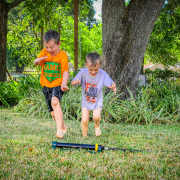From Backyard To Bushland: Why Outdoor Play Is Vital For Growing Minds
Outdoor play is more than just a way for children to burn off energy. It plays a crucial role in their overall development. Activities in natural settings offer unique opportunities for learning, growing, and building essential life skills. From running in the backyard to exploring bushland, outdoor play nurtures growing minds in ways that indoor activities cannot replicate.
Children who spend time outdoors tend to be more physically active, which promotes better health. Physical play helps develop strong muscles, improves coordination, and enhances overall fitness. Additionally, natural settings provide an ever-changing environment that stimulates cognitive development. Engaging with nature encourages curiosity and problem-solving, helping children understand the world around them more deeply.
Beyond the physical and cognitive benefits, outdoor play also supports social and emotional growth. Playing outdoors allows children to interact with their peers in less structured settings, enhancing social skills and emotional resilience. They learn to navigate social dynamics, cooperate with others, and develop empathy. This kind of unstructured play is essential for building confidence and independence.
By understanding the importance of outdoor play, parents and educators can make informed choices that support the holistic development of children. Creating opportunities for outdoor activities, whether in the backyard or bushland, is vital for fostering a well-rounded growth. Discover the many benefits of outdoor play and how you can encourage these activities for your child’s benefit.
Physical Health Benefits of Outdoor Play
Outdoor play significantly contributes to children’s physical health. Activities outside encourage children to move, run, jump, and climb, which all help to develop strong muscles and bones. This type of exercise boosts cardiovascular health, helping to prevent childhood obesity and related health issues such as diabetes and high blood pressure.
Being outside also exposes children to sunlight, which is vital for vitamin D production. Vitamin D is crucial for bone health and immune system function. Regular exposure to fresh air and natural light can also improve sleep patterns and reduce stress levels, promoting overall well-being.
Moreover, outdoor play enhances motor skills and coordination. Activities like playing on playground equipment, kicking a ball, or riding a bike require balance and control, which are essential for physical development. These activities help children improve their hand-eye coordination and spatial awareness, skills that benefit them in everyday tasks and other physical activities.
Enhancing Cognitive Development Through Nature
Nature provides a rich and varied environment that stimulates cognitive development in children. When children explore the outdoors, they encounter new and diverse experiences that promote problem-solving and critical thinking. Whether they are figuring out how to build a den or navigating through a forest path, these activities challenge their minds and encourage creative thinking.
Natural settings also offer countless opportunities for observational learning. Children can learn about different plants, animals, and natural phenomena, sparking their curiosity and expanding their knowledge. This hands-on learning is much more impactful than reading from a book or watching a video, as it engages multiple senses and creates lasting memories.
Additionally, outdoor play can improve focus and attention. Research has shown that spending time in nature can reduce symptoms of ADHD and help children concentrate better. The calming effect of natural surroundings helps clear the mind, making it easier for children to pay attention and absorb new information. This boost in cognitive function can translate to better performance in school and other learning environments.
Social Skills and Emotional Resilience in Outdoor Settings
Outdoor play is crucial for developing social skills and emotional resilience in children. When children play outside, they often engage in group activities that require cooperation, negotiation, and sharing. These interactions help them build essential social skills, such as effective communication, conflict resolution, and teamwork.
Natural settings also provide a unique environment where children can practice independence and decision-making. They learn to assess risks, make choices, and solve problems on their own, which fosters a sense of autonomy and confidence. These experiences are vital for building emotional resilience, helping children handle setbacks and challenges more effectively.
Moreover, playing outdoors can reduce stress and anxiety. Nature has a calming effect, which can help children manage their emotions better. When children feel less stressed, they are more likely to engage positively with others, further enhancing their social skills and emotional well-being. Encouraging children to explore and play in natural settings can significantly impact their ability to interact with others and cope with life’s ups and downs.
Practical Tips for Encouraging Outdoor Play
Encouraging your child to spend more time outdoors doesn’t have to be complicated. Here are some practical tips to make outdoor play a regular part of your child’s routine:
1. Set a Schedule: Dedicate specific times each day for outdoor play. This consistency helps children know what to expect and builds a routine around spending time outdoors.
2. Create a Safe Play Area: Set up a safe and engaging space in your backyard with age-appropriate toys and equipment like sandboxes, swings, and climbing structures.
3. Plan Nature Outings: Visit local parks, nature reserves, or bushland areas regularly. These trips can be exciting adventures and provide diverse environments for play and exploration.
4. Involve Friends: Invite other children to join in outdoor activities. Group play can make outdoor time more fun and help children develop social skills.
5. Model Outdoor Activity: Children often mimic their parents. Show enthusiasm for outdoor activities by joining in, whether it’s playing catch, going on a hike, or gardening together.
6. Limit Screen Time: Encourage outdoor play by setting limits on screen time. Children are more likely to engage in outdoor activities when there’s less temptation to stay indoors.
By incorporating these tips into your daily routine, you can help foster a love for outdoor play in your child, promoting their overall development and well-being.
Conclusion
Outdoor play is indispensable for the holistic growth of children. It offers countless benefits, from improving physical health and enhancing cognitive development to building social skills and emotional resilience. By encouraging children to spend time in nature, parents and educators provide them with invaluable opportunities to explore, learn, and grow in a supportive environment.
Eskay Kids understands the importance of outdoor play in early childhood development. Our play-based programmes are designed to nurture every aspect of a child’s growth through intentional and engaging outdoor activities. Visit our early childhood education centre today to learn how our approach can support your child’s development and help them thrive in a natural setting.




